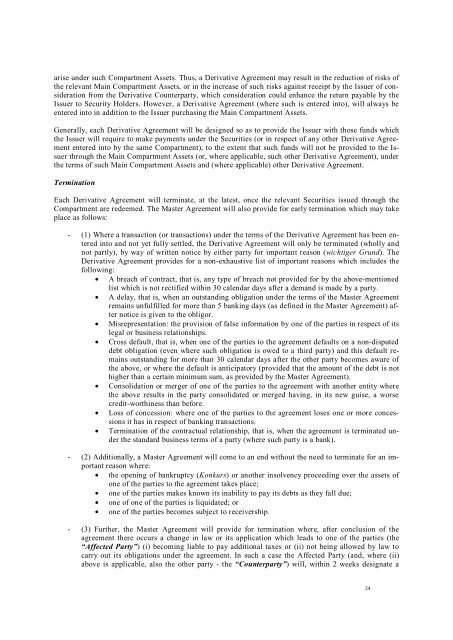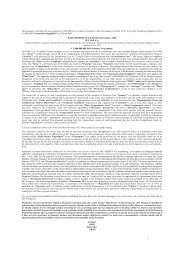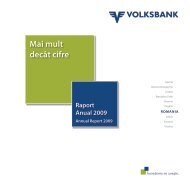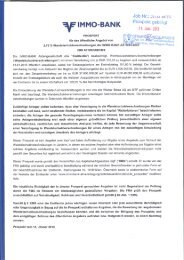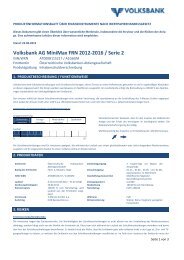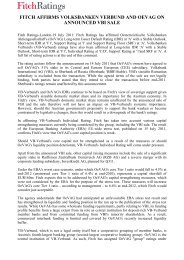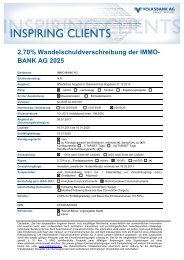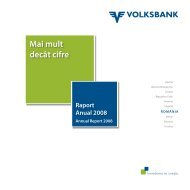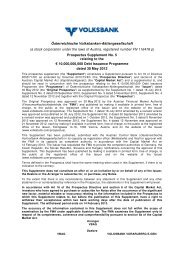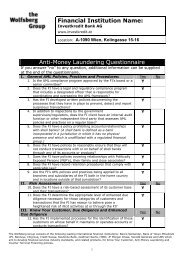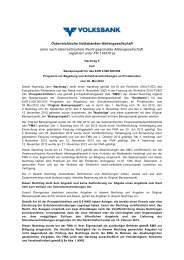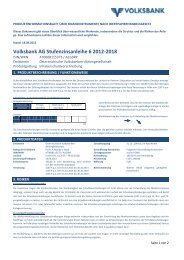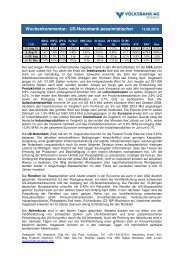EUR 3000000000 debt issuance programme, 10 ... - Volksbank AG
EUR 3000000000 debt issuance programme, 10 ... - Volksbank AG
EUR 3000000000 debt issuance programme, 10 ... - Volksbank AG
Create successful ePaper yourself
Turn your PDF publications into a flip-book with our unique Google optimized e-Paper software.
arise under such Compartment Assets. Thus, a Derivative Agreement may result in the reduction of risks of<br />
the relevant Main Compartment Assets, or in the increase of such risks against receipt by the Issuer of consideration<br />
from the Derivative Counterparty, which consideration could enhance the return payable by the<br />
Issuer to Security Holders. However, a Derivative Agreement (where such is entered into), will always be<br />
entered into in addition to the Issuer purchasing the Main Compartment Assets.<br />
Generally, each Derivative Agreement will be designed so as to provide the Issuer with those funds which<br />
the Issuer will require to make payments under the Securities (or in respect of any other Derivative Agreement<br />
entered into by the same Compartment), to the extent that such funds will not be provided to the Issuer<br />
through the Main Compartment Assets (or, where applicable, such other Derivative Agreement), under<br />
the terms of such Main Compartment Assets and (where applicable) other Derivative Agreement.<br />
Termination<br />
Each Derivative Agreement will terminate, at the latest, once the relevant Securities issued through the<br />
Compartment are redeemed. The Master Agreement will also provide for early termination which may take<br />
place as follows:<br />
- (1) Where a transaction (or transactions) under the terms of the Derivative Agreement has been entered<br />
into and not yet fully settled, the Derivative Agreement will only be terminated (wholly and<br />
not partly), by way of written notice by either party for important reason (wichtiger Grund). The<br />
Derivative Agreement provides for a non-exhaustive list of important reasons which includes the<br />
following:<br />
• A breach of contract, that is, any type of breach not provided for by the above-mentioned<br />
list which is not rectified within 30 calendar days after a demand is made by a party.<br />
• A delay, that is, when an outstanding obligation under the terms of the Master Agreement<br />
remains unfulfilled for more than 5 banking days (as defined in the Master Agreement) after<br />
notice is given to the obligor.<br />
• Misrepresentation: the provision of false information by one of the parties in respect of its<br />
legal or business relationships.<br />
• Cross default, that is, when one of the parties to the agreement defaults on a non-disputed<br />
<strong>debt</strong> obligation (even where such obligation is owed to a third party) and this default remains<br />
outstanding for more than 30 calendar days after the other party becomes aware of<br />
the above, or where the default is anticipatory (provided that the amount of the <strong>debt</strong> is not<br />
higher than a certain minimum sum, as provided by the Master Agreement).<br />
• Consolidation or merger of one of the parties to the agreement with another entity where<br />
the above results in the party consolidated or merged having, in its new guise, a worse<br />
credit-worthiness than before.<br />
• Loss of concession: where one of the parties to the agreement loses one or more concessions<br />
it has in respect of banking transactions.<br />
• Termination of the contractual relationship, that is, when the agreement is terminated under<br />
the standard business terms of a party (where such party is a bank).<br />
- (2) Additionally, a Master Agreement will come to an end without the need to terminate for an important<br />
reason where:<br />
• the opening of bankruptcy (Konkurs) or another insolvency proceeding over the assets of<br />
one of the parties to the agreement takes place;<br />
• one of the parties makes known its inability to pay its <strong>debt</strong>s as they fall due;<br />
• one of one of the parties is liquidated; or<br />
• one of the parties becomes subject to receivership.<br />
- (3) Further, the Master Agreement will provide for termination where, after conclusion of the<br />
agreement there occurs a change in law or its application which leads to one of the parties (the<br />
“Affected Party”) (i) becoming liable to pay additional taxes or (ii) not being allowed by law to<br />
carry out its obligations under the agreement. In such a case the Affected Party (and, where (ii)<br />
above is applicable, also the other party - the “Counterparty”) will, within 2 weeks designate a<br />
24


